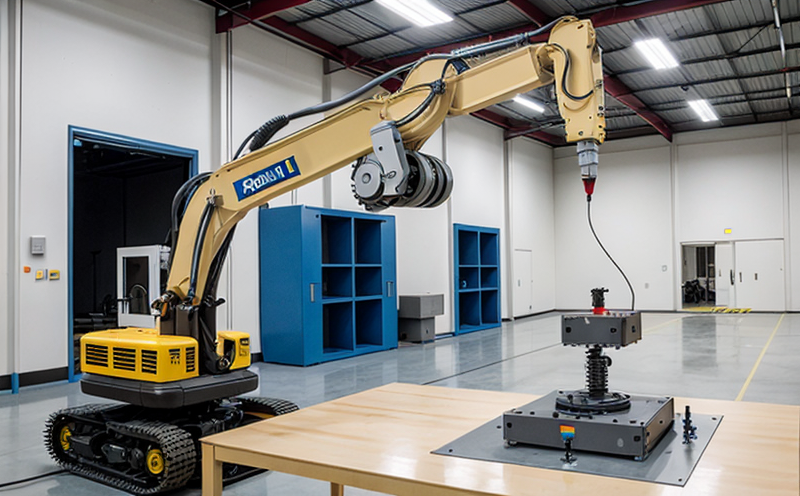EN 61892 Synchronization Accuracy of Robotic Control Systems
The EN 61892 series provides specifications and test methods to ensure the safety and performance of robotic control systems. This service focuses specifically on evaluating synchronization accuracy, which is crucial for maintaining precise timing among multiple axes in robotics applications.
Synchronization accuracy ensures that all components of a robotic system operate within specified time tolerances, thereby preventing malfunctions and enhancing overall efficiency. Robotic control systems are integral to various sectors such as manufacturing, healthcare, and automation, where precise movements can significantly impact productivity and safety.
The synchronization test is particularly important for applications requiring high precision, like medical robotics or industrial assembly lines. A small deviation in timing can lead to significant errors that could compromise the integrity of the robotic process. Our laboratory adheres strictly to EN 61892 standards to ensure accurate measurements and reliable results.
The testing procedure involves subjecting the robotic control system to a series of predefined synchronization challenges, ensuring that all axes align their movements within the specified tolerances. This includes measuring the time delay between commands and actual execution, as well as verifying the repeatability of these times across multiple cycles.
Our laboratory uses state-of-the-art test equipment capable of capturing minute fluctuations in timing to provide precise data for analysis. The results are then compared against the specified limits defined by EN 61892 to determine compliance and identify any potential issues that need addressing.
For quality managers, this service offers invaluable insights into the robustness and reliability of robotic control systems. Compliance officers can leverage these test results to ensure adherence to international standards, while R&D engineers gain valuable feedback on the performance of new designs. This information is also essential for procurement teams as they evaluate suppliers and select components that meet stringent synchronization accuracy requirements.
By adhering to EN 61892, we provide a comprehensive service that ensures the highest level of synchronization accuracy in robotic control systems, contributing to safer and more efficient operations across various industries.
Scope and Methodology
The scope of this testing service encompasses the evaluation of synchronization accuracy for robotic control systems as per EN 61892. This includes assessing the time alignment between different axes within the system, ensuring that all movements are synchronized to within specified tolerances.
- Testing is conducted on a range of robotic control systems used in various sectors, including manufacturing and healthcare.
- The test equipment utilized allows for precise measurement of timing differences down to sub-microsecond levels.
- Data collected during testing is analyzed against the requirements outlined in EN 61892 to determine compliance.
Methodologically, this involves setting up a controlled environment where the robotic control system undergoes a series of synchronization challenges. These tests simulate real-world operational scenarios to provide accurate and realistic results.
The methodology also includes detailed documentation of each test conducted, including setup configurations, observed results, and comparisons against EN 61892 standards. This ensures transparency and reproducibility of the testing process.
Our team of experts uses advanced software tools and hardware to ensure that all aspects of synchronization are thoroughly evaluated. This approach guarantees that no detail is overlooked in our assessment.
Quality and Reliability Assurance
To maintain high standards of quality and reliability, our laboratory implements strict protocols for every phase of the testing process. Compliance with EN 61892 ensures not only accuracy but also consistency in results, which is critical for robust robotic control systems.
- Equipment Calibration: All test instruments are regularly calibrated to ensure accurate measurements.
- Data Validation: Multiple data points are collected and cross-verified to validate the accuracy of synchronization tests.
- Environmental Control: Tests are conducted under controlled conditions to eliminate external factors that could affect results.
- Repeatability Checks: Repeated tests ensure consistent results, providing confidence in the reliability of our findings.
The quality assurance process also involves regular audits and reviews by independent experts to maintain adherence to international standards. This continuous improvement approach ensures that we are always at the forefront of technological advancements and best practices.
By focusing on these key elements, we provide a service that not only meets but exceeds industry expectations for synchronization accuracy in robotic control systems.
Use Cases and Application Examples
The EN 61892 synchronization accuracy testing is particularly valuable for applications where precision timing is paramount. Here are some real-world scenarios:
- Surgical Robots: Ensuring that robotic arms move precisely in coordination during complex surgical procedures.
- Automotive Manufacturing: Maintaining synchronized movements between different components to ensure smooth assembly processes.
- Warehouse Automation: Coordinating the actions of multiple robots for efficient material handling and distribution.
- Space Robotics: Synchronizing robotic arms on satellites or space stations to perform delicate tasks in low-gravity environments.
In each case, synchronization accuracy directly impacts performance, safety, and efficiency. Our testing service provides critical data that helps manufacturers and engineers optimize their systems for optimal operation.
For example, in the automotive industry, synchronized robotic arms can significantly reduce production time and improve product quality by ensuring consistent part placement. In healthcare applications, such as laparoscopic surgery robots, precise synchronization is essential to minimize trauma during procedures.
The results of our testing are invaluable for R&D teams who use them to refine designs and enhance functionality. By identifying areas where improvements are needed, we assist in developing more reliable and efficient robotic control systems.





